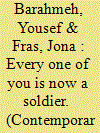| Srl | Item |
| 1 |
ID:
190980


|
|
|
|
|
| Summary/Abstract |
In this article, we examine the use of war metaphors in Jordanian official discourse on the Covid-19 pandemic in 2020-21, through an analysis of videos of public statements and media releases made by Jordanian government officials at press conferences and interviews with local media outlets which were disseminated through social media. Against both the linguistic essentialism and the Western-centrism of conventional analyses of (war) metaphors, we demonstrate that Jordanian officials’ framing of Covid-19 as a security threat is not just a function of the rhetorical appeal of militarised discursive responses to the pandemic, but also aligns closely with existing ideologies of the militarisation and securitisation of public life. The mobilisation of metaphor in the context of the Covid-19 pandemic should thus be understood in relation to the specific discourses that pervade the communicative channels through which it is distributed.
|
|
|
|
|
|
|
|
|
|
|
|
|
|
|
|
| 2 |
ID:
190981


|
|
|
|
|
| Summary/Abstract |
This article investigates the socio-linguistic and pragmatic functions of Jordanian political humour after the Arab Spring revolutions from the perspective of Mikhail Bakhtin’s theory of carnival and the carnivalesque (folk humour). The analysis undertaken here of Jordanian political humour reveals a peculiar use of carnivalesque political humour via the use of humour as a socio-linguistic and pragmatic device that allows the ridicule of the government but not of the monarch. This occurs through the use of (1) conversational implicature, (2) rhetorical question, (3) malapropism, (4) taboo language and (5) reference and inference. This humour appears to be a form of ‘licensed disruption,’ an idea that is used extensively by some scholars of Bakhtin to talk about the popular politics of resistance and its limits and targets – what can and cannot be said within legal frameworks and societal expectations. Such humour, I found, has constantly called for reform of the government but not for regime change or revolution and has led to significant socio-political changes in Jordanian society, through which people are more willing to criticise and mock the government in social media platforms, such as Facebook.
|
|
|
|
|
|
|
|
|
|
|
|
|
|
|
|